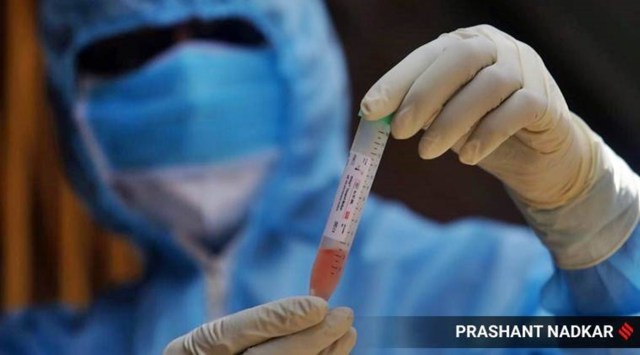Magic Malegaon project: Less Covid cases in city, MUHS to study blood samples of Malegaon residents
Under the 'Magic Malegaon' project, the MUHS has taken up the initiative to investigate why the region, which was once a hotspot in the first wave, continues to report low Covid-19 cases unlike other regions in Nashik district.
 The blood samples will be sent to the virology laboratory in Dhule, where antibody and Elisa tests will be conducted. (Representative image)
The blood samples will be sent to the virology laboratory in Dhule, where antibody and Elisa tests will be conducted. (Representative image)In a first in the state, the Maharashtra University of Health Science (MUHS) has collected 2,700 blood samples from Malegaon city – located 280 km north of Mumbai – to find a clinical explanation behind the low Covid-19 cases in the region. The role of Malegaon’s famous ‘immunity booster kadha’ will also be examined.
Under the ‘Magic Malegaon’ project, the MUHS has taken up the initiative to investigate why the region, which was once a hotspot in the first wave, continues to report low Covid-19 cases unlike other regions in Nashik district. A team of over 260 healthcare workers from six medical colleges that includes unani, allopathy and ayurveda centres affiliated with MUHS, have collected 2,700 blood samples from congested areas for the analysis.
“This is the first time in the state that different departments like public health and administrative as well as MUHS and district hospitals have come together to take up such a clinical study. With the completion of the study, we may have the explanation behind the change in the epidemiological spread of the virus in the region,” said Lieutenant General Dr Madhuri Kanitkar, Vice-Chancellor of MUHS.
Malegaon was a hotspot of infection in the first wave with a case fatality rate of 3.62 per cent. Out of the 4,588 Covid-19 cases, 166 patients succumbed to the infection. In the second wave, of the 8,398 identified cases, 170 of the infected died with a CFR (Case Fatality Rate) of 2.02 per cent. In the third wave, only eight deaths were reported among the 843 infected with a CFR of 0.95 per cent.
Along with this, the participants are also asked a set of questions about their diet, medical history, previous Covid-19 infection, medication and if they have consumed homemade remedies and herbal concoctions like ‘kadha’ for immunity building. “The kadha had become quite popular in Malegaon in the second wave, which was recommended by a local Unani college. The Unani formulation is called ‘Joshanda’, which is made of different herbs. So, in the study, the role of the herbs will also be examined,” said Bhalchandra Gosavi, Commissioner of the Malegaon Municipal Corporation.
Joshanda contains elements that help in easing respiratory irritation and relieving cough. It is being used to treat cold, cough, and related allergic disorders.
The blood samples will be sent to the virology laboratory in Dhule, where antibody and Elisa tests will be conducted. However, the collection of the samples wasn’t an easy task as the healthcare workers often had to face resistance from the people. So, the authorities had to involve local maulanas and hakims to convince the residents to provide their blood samples for the study.
“In the beginning, there was resistance. So, we had to rope in local influencers to gain the trust of the people. We had to make them understand the importance of the study,” said Dr Kanitkar. The second phase of the study will be reinitiated in May after the completion of the upcoming Eid festival.







